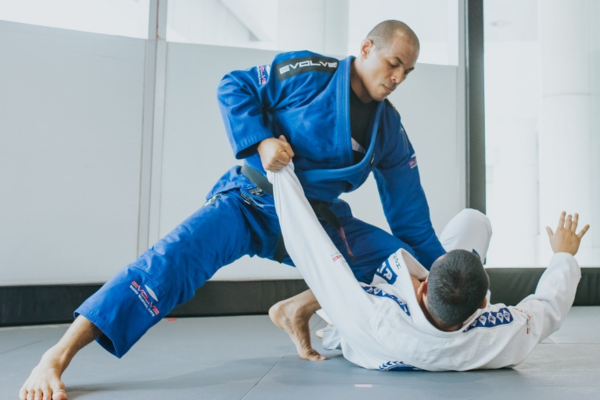Recovering after a heavy BJJ session: Tips for optimal recovery


Brazilian Jiu-Jitsu is intense and has a unique impact on your body. It requires strength, flexibility, and endurance, which puts a lot of strain on both your muscles and cardiovascular system. Understanding how your body responds to a tough BJJ session is key to effective recovery and injury prevention.
Which muscles and systems are being taxed?
During a BJJ session, the core, back, arms and legs are the most used. Your core stabilizes your movements, while your arms and legs work to generate grip and power while grappling and controlling opponents. In addition to muscle strain, your cardiovascular system is also challenged by the high intensity of sparring. All of this makes recovery a priority to prevent overuse.
Common aches and pains and how to treat them
After an intense session, you may experience muscle pain, bruising, and fatigue. It is important not to ignore minor aches and pains. Use techniques such as foam rolling to relax tense muscles and apply cold compresses to swellings. In addition, light exercise such as walking can improve circulation and speed up your recovery.
Essential BJJ recovery methods
An effective recovery plan involves a combination of physical, mental, and nutritional strategies. By focusing on recovery, you can return to the mat faster and improve your performance. Here are the most important recovery methods that every BJJ practitioner should know.
The importance of a good warm-down
Cooling down after a tough BJJ session will help your muscles relax and prevent stiffness. Try dynamic stretches like leg swings and torso twists to maintain flexibility and increase blood flow. Add breathing exercises to normalize your heart rate and breathing. These simple steps will reduce your risk of injury and help your body recover faster.
Post-workout hydration and nutrition
After an intense workout, your body is exhausted and dehydrated. Replace lost fluids with water or isotonic drinks. In terms of nutrition, proteins are crucial for muscle repair, while carbohydrates replenish your energy levels. A smoothie with whey protein, banana, and spinach is a great post-workout option. Don’t forget to eat plenty of magnesium-rich foods, such as nuts and leafy greens, to prevent muscle cramps.
Sleep and rest as cornerstones of recovery
Sleep is perhaps the most underrated recovery method. During sleep, your body repairs itself on a cellular level and hormones are regulated. Aim for at least 7-9 hours of sleep per night, especially after heavy training days. Ensure a cool, dark sleeping environment and avoid screens for an hour before bed. Sufficient rest days in your training schedule are also essential to prevent physical and mental overload.
Recover with tools and products
For a quick and effective recovery, you can use a variety of tools and products. These tools are designed to reduce muscle soreness, increase blood flow, and get you back on the mat faster. Here are some practical options for any BJJ practitioner.
Use of foam rollers and massages
Foam rollers are a powerful tool for loosening tense muscles and reducing knots. Self-massage with a foam roller on your legs, back and shoulders can improve blood circulation and relieve pain. Combine this with professional massages for deep muscle relaxation and optimal recovery. Make sure your movements are controlled and consistent to avoid overexertion.
Compression garments and other recovery technologies
Compression clothing like tights and sleeves can help increase circulation and reduce muscle soreness. Wearing them after a tough session helps flush out toxins faster, speeding up your recovery process. Additionally, consider other technologies like massage guns or infrared lamps that focus on deeper muscle relaxation and pain relief. These tools are easy to use at home and ideal for consistent recovery.
Mental and emotional aspects of recovery
Recovery isn’t just about your body; your mind plays a crucial role as well. Mental peace and emotional well-being are what keep you motivated and keep enjoying BJJ in the long run. By consciously paying attention to these aspects, you can come back stronger after a tough training session.
The importance of mental peace
Mental overload can be just as damaging as physical overload. Take time for meditation or breathing exercises to reduce stress and quiet your mind. For example, focus on deep abdominal breathing or use apps like Headspace for guided meditations. These moments of calm not only improve your mental clarity, but also support physical recovery by lowering stress hormones.
Dealing with frustrations and loss of motivation

Coming off a tough session can be discouraging, especially if your performance didn’t meet your expectations. Make sure you remind yourself of your progress and focus on the small wins. Talk to teammates or coaches for support and advice. Positive visualization can revitalize your motivation and help you refocus on your goals.
At Fightstyle, we understand the importance of mental and physical balance in your recovery process. Visit our webshop for high-quality tools such as foam rollers and compression clothing that support your recovery. Also, discover our blogs for tips on mental training and stay stronger, both on and off the mat. Join the Fightstyle Family today and train with confidence and fun!
 Nederlands
Nederlands English
English Deutsch
Deutsch Français
Français


Interessant dat jullie magnesiumrijke voeding noemen dat zie je niet vaak terug in dit soort tips. Hebben jullie zelf voorkeur voor bepaalde snacks of maaltijden die je direct na het trainen het beste kunt nemen?
Leave a comment